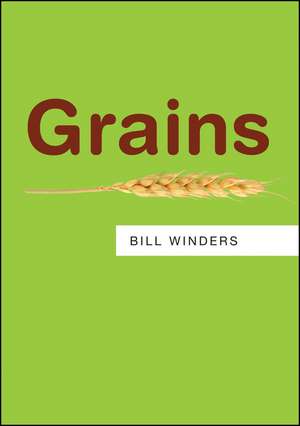Grains – Resources: Resources
Autor B Windersen Limba Engleză Hardback – 20 oct 2016
Din seria Resources
-
 Preț: 129.41 lei
Preț: 129.41 lei -
 Preț: 120.10 lei
Preț: 120.10 lei -
 Preț: 119.85 lei
Preț: 119.85 lei -
 Preț: 143.42 lei
Preț: 143.42 lei -
 Preț: 127.62 lei
Preț: 127.62 lei -
 Preț: 159.02 lei
Preț: 159.02 lei -
 Preț: 159.79 lei
Preț: 159.79 lei -
 Preț: 159.79 lei
Preț: 159.79 lei - 15%
 Preț: 429.04 lei
Preț: 429.04 lei -
 Preț: 469.89 lei
Preț: 469.89 lei - 15%
 Preț: 431.50 lei
Preț: 431.50 lei - 19%
 Preț: 446.34 lei
Preț: 446.34 lei -
 Preț: 434.54 lei
Preț: 434.54 lei - 24%
 Preț: 90.58 lei
Preț: 90.58 lei - 22%
 Preț: 93.29 lei
Preț: 93.29 lei - 27%
 Preț: 308.95 lei
Preț: 308.95 lei - 16%
 Preț: 103.06 lei
Preț: 103.06 lei - 27%
 Preț: 310.83 lei
Preț: 310.83 lei - 22%
 Preț: 93.29 lei
Preț: 93.29 lei - 22%
 Preț: 99.56 lei
Preț: 99.56 lei
Preț: 429.85 lei
Preț vechi: 505.70 lei
-15% Nou
Puncte Express: 645
Preț estimativ în valută:
82.26€ • 89.32$ • 69.10£
82.26€ • 89.32$ • 69.10£
Carte tipărită la comandă
Livrare economică 22 aprilie-06 mai
Preluare comenzi: 021 569.72.76
Specificații
ISBN-13: 9780745688039
ISBN-10: 0745688039
Pagini: 240
Dimensiuni: 149 x 216 x 21 mm
Greutate: 0.41 kg
Editura: Polity Press
Seria Resources
Locul publicării:Chichester, United Kingdom
ISBN-10: 0745688039
Pagini: 240
Dimensiuni: 149 x 216 x 21 mm
Greutate: 0.41 kg
Editura: Polity Press
Seria Resources
Locul publicării:Chichester, United Kingdom
Public țintă
Students of politics, geography, environmental and food studies and general readers interested in current affairs.Cuprins
Notă biografică
Bill Winders is an Associate Professor of Sociology in the School of History and Sociology at the Georgia Institute of Technology.
Descriere
Grains - particularly maize, rice, and wheat - are the central component of most people s diets, but we rarely stop to think about the wider role they play in national and international policy-making, as well as global issues like food security, biotechnology, and even climate change.
